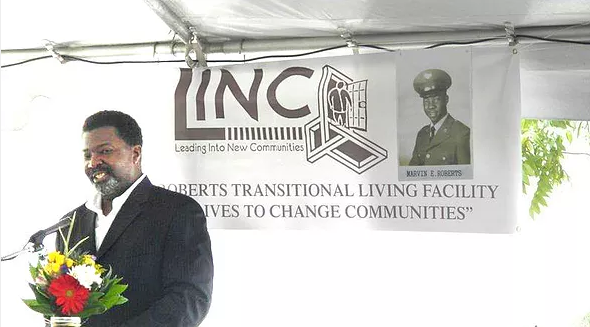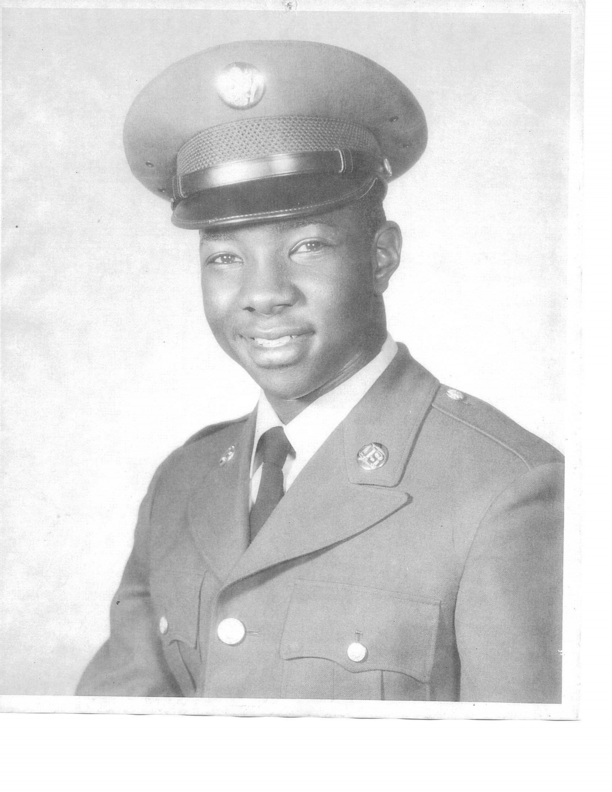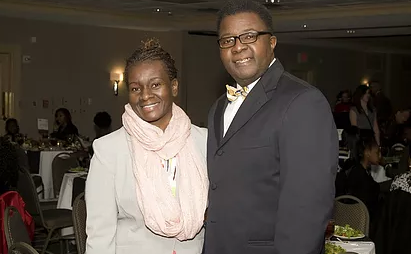LINC’s Value to the Community
- LINC has served approximately 2674 adults and 290 youth since it started providing services in 2000
- LINC serves an additional 100-150 adults a year through drop-in programs and referrals
- LINC has an 85% success rate compared to North Carolina’s state rate of ~40%. Forty-one percent of state released individuals who do not participate in re-entry programs return to prison (2011). Reference: Pew State of Recidivism.
- LINC empowers people returning from prison to become employed, tax paying citizens, contributing to and strengthening the local economy.
- LINC increases the likelihood of a person becoming more employable with our emphasis on GED attainment, post-secondary education, vocational training and work experience.
- LINC’s reach is compounded by the impact on those surrounding our residents and clients: children, parents, siblings, neighbors, friends, and the community at large.

LINC, Inc. provides:
• Transitional living coupled with a stable, sustaining employment program, two components which reduce recidivism by 50%.
• Counseling, work experience and training, and case management support services which enhance the level of individual success.
• Close screening of participants before admission to the program to enhance the safety of the community as well as other residents.
• 24-hour supervised and structured living environment.
• “Functional mending” which allows individuals opportunities to undo negative behaviors and experience and learn positive ones.
• Opportunities for at risk youth to learn positive behaviors with the philosophy of the LITE program that it is better to “build a boy than mend a man”.
• Reduces the housing cost to the state: cost to house an individual in LINC Inc.’s campus is $5,000 annually compared to $27,572 annually to house an inmate in prison (2012). (http://randp.doc.state.nc.us/pubdocs/0007069.PDF)
• Competent, knowledgeable, compassionate staff which assist participants with their re-entry process.


LINC’s History
The struggles of Marvin E. Roberts with addiction as well as his difficulties of re-entry after numerous incarcerations were the seed for the creation of LINC, Inc. by his brother, Frankie Roberts, and Tracey Ray. They co-founded LINC, Inc. after Marvin’s unexpected death during a seemingly minor surgery in 1998 at the young age of 50.
Marvin E. Roberts was born March 4, 1948 in Wilmington, NC. In March, 1998, a few days before his 50th birthday, Marvin passed away in New Hanover Regional Medical Center after minor surgery. Had Marvin, his family, and the community understood more about the disease of addiction and the needs associated with reentry, Marvin’s experiences could have been different. Marvin’s health had been compromised by his life of addiction and incarceration.
As a child, Frankie looked up to his older brother. As an adult, however, he became burned out and frustrated with dealing with his brother’s challenges in life. For his own survival, Frankie pulled away from his brother and focused on building a life to support his own family. There was a wide gulf between the 2 brothers, beyond the 17 year age difference, created by Marvin’s on-going drug addiction and repeated incarcerations.
Considered the smartest of William and Beulah Roberts’ children, Marvin had a strong thirst for knowledge. He was interested in music as a young boy and as an adult studied marine biology. He was always well-dressed, cool, calm, and collected. Marvin got along well with all people, could talk circles around anyone, and had the singing voice of an angel.
Marvin attended a private high school in Pennsylvania but did not graduate. He did complete his GED while serving in the United States Army after being drafted in 1967. He served as a helicopter mechanic during the Vietnam War. Marvin married his childhood sweetheart, Ophelia Tindall, in 1970. He returned from his tour of duty in 1969 with a heroin addiction and after 3 or 4 months, enlisted for a second tour in Vietnam, where his addiction was easily satisfied. After his final return to the United States, Marvin caught his first drug-related conviction. Between 1974 and 1997, Marvin served a total of 12 years in prison.
For much of the time between multiple prison sentences, Marvin was considered to be a “functional addict.” He completed college level coursework in Marine Biology at A&T State University and at Cape Fear Community College. His thirst for knowledge drew him to further his education but his addiction inevitably created a seemingly insurmountable barrier.
Most of society had difficulty understanding the impact serving in Vietnam had on military personnel. A large number of Vietnam vets came home addicted, unable to adapt to life, or find employment. Many were drafted right out of high school. Some, such as Marvin, did not even have a high school diploma when they went off to fight. Their job options upon return were extremely limited.
Society was not supportive of the returning vets and the post-traumatic stress disorders many experienced remained undiagnosed and untreated as they were not even defined until many years after the war. The number of vets who returned home after becoming addicted to drugs in Vietnam was yet to be revealed. There was no VA support. Families struggled to cope with the changes their sons had experienced while away. The Roberts family was no different.
Frankie was still very young when his brother returned from Vietnam. He had difficulty understanding how his older brother had put himself in the position of becoming addicted, why he was neither able to complete his education nor hold a job. He could not understand how he kept going through the revolving doors of prison.
There was nothing provided by society to assist family members such as Frankie. As he matured, however, he became more understanding of how Vietnam had impacted the lives of many. He learned how difficult it was for people to overcome their struggles with addiction. Attempts to re-enter society after incarceration without adequate skills and community support made the correction system a revolving door for many, including his brother Marvin. He became more compassionate.
As Frankie heard more of the same life stories of families experiencing challenges similar to those of his brother, Frankie began to understand that his brother needed help and Frankie believed he could help him. He felt that he could be of assistance and that was his plan.
Frankie committed to reach out to his brother but it was too late. He actually was on his way to the hospital to visit him when he received a call that his brother had passed away. Marvin died just a few days before his 50th birthday. It was at that point that Frankie made a commitment to reach out to others who faced the same challenges as his brother – difficulties of overcoming drug addiction and re-entry into society as ex-offenders. Frankie was 29 years of age when his brother died.
LINC was born in the back of Frankie’s barbershop, the House of Creations, at 1202 Castle St. As the owner of a community barber shop for 18 years, Frankie had an ear to the ground as to needs in the community. He had received an informal education in community organizing, job development, relationship building, and individual/family counseling.
Initially, he researched the next steps in his life’s journey in an informal way, by seeking ways to assist ex-offenders. He networked with community organizations, law enforcement officials and community leaders who shared similar concerns about the best way to assist ex-offenders in their re-entry into the community.
All agreed that positive, supportive re-entry was in the best benefit to the community for public safety, a more fully employed population, a decrease in substance abuse activities and decrease in crime rates. They discussed common interests in developing sustainable resources and supports that would assist ex-offenders with successful re-entry into the community as productive members of society with a diminished chance of returning to prison. The groundwork for LINC, initially a volunteer organization, was laid.
Since 2000, Frankie Roberts has been the Executive Director of Leading Into New Communities (LINC) Inc., a non-profit agency that provides shelter and services for men and women returning from prison. LINC defines its mission as “to educate and motivate youth to make positive life choices while empowering men and women returning from incarceration to be productive members of our community.” LINC has successfully helped reintegrate over 1200 men and women who have been released from prison since 2002; 92% of them have remained out of prison.
LINC moved into the Castle St. space in 2000 where its New Workforce Program is housed. It has expanded some services to other locations including its LITE Program which is housed at 801 Princess St., and the M.E. Roberts Transitional Living Campus at 222 Division Drive which opened in August 2012.
Frankie continues to serve his community beyond LINC. He has served as is the Chairman of the Department of Social Services’ Board of Directors, member of Criminal Justice Partnership Board, member of Cancer Outreach Board through New Hanover Regional Medical Center, and past member of the Juvenile Crime Commission.
Frankie is honored to be a husband, father, and grandfather. Frankie considers himself blessed to have the strong “dream team” at LINC, Inc. working diligently daily to identify and meet the needs of individuals returning from incarceration.


Tracey Ray now directs the Turning Away From Fear Program.
Into the Future: LINC’S Vision for Connectivity
The LINC staff work under different program names, while supporting and operating cohesively. We fill different roles, but all work to support the mission of LINC.
In addition to Residential programs and Supportive (non-residential) programs, LINC continues to provide Capacity Building programs – LINC Anatomy, for example – within the organization and the broader community. Partnerships are integral to the work we do, and are constantly evolving and broadening.
Most importantly, LINC will always approach its work with a CLIENT FIRST mentality.
